
Tell us what you need to find a matching loft conversion specialist

Get free quotes from professionals near you

Compare offers and choose the one that best matches your need
- Householdquotes.co.uk
- Driveway
- Driveway Materials
- Driveway Slabs
Driveway Slabs: Everything You Need To Know

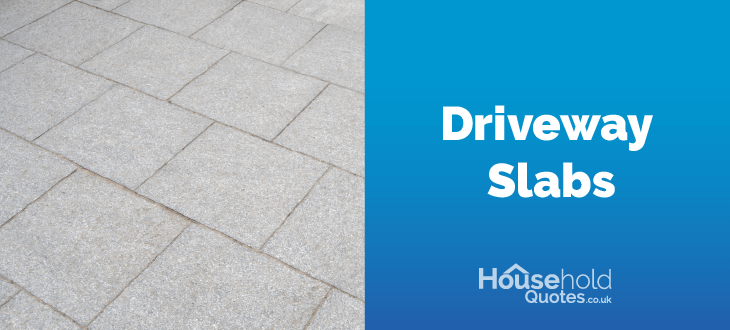
- The most popular driveway slabs are made from limestone, sandstone, granite, or porcelain.
- Depending on the chosen material, driveway slabs can cost between £20 and £150 per m2.
- Slabs should be at least 50 mm thick to withstand the weight of vehicles; anything thinner may cause cracking and sinking.
- If maintained properly, driveway slabs can last up to 25 years.
- Driveway slabs are versatile and can be designed into different patterns, commonly herringbone or basketweave.
- They are low-maintenance and weather-resistant, which reduces future repair and maintenance costs.
A well-maintained driveway enhances your home's curb appeal and provides a durable and safe surface for vehicles and pedestrians.
Paved driveway slabs stand out among the various options available for driveway construction for their durability, versatility, and aesthetic appeal.
Whether building a new driveway or considering an upgrade, understanding the nuances of driveway slabs is essential to making informed decisions.
This comprehensive guide will delve into everything you need about driveway slabs. From selecting suitable materials and understanding the installation process to exploring design options and maintenance tips, we'll cover all the critical aspects to help you create a driveway that combines functionality and style.
Whether you're installing a new driveway or giving your existing one a makeover, understanding driveway slabs can help you make informed decisions while enhancing your property's value and curb appeal.
Are you ready to enhance your home with new driveway slabs? Finding the right driveway specialist is crucial. To save time comparing multiple quotes, fill out our 30-second form.
Afterwards, you will receive four free, non-binding quotes from local driveway specialists that match your needs. Click below to find out more.
- Describe your needs
- Get free quotes
- Choose the best offer
It only takes 30 seconds

What are driveway paving slabs?
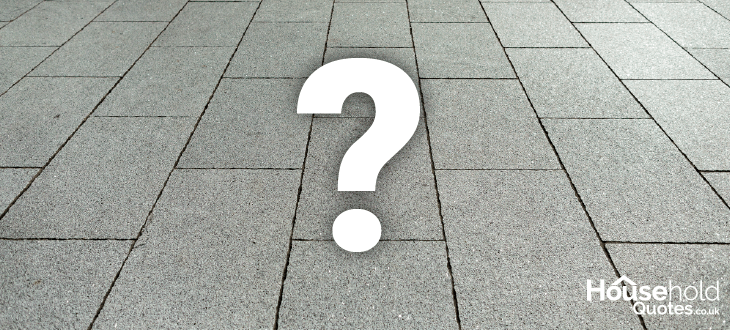
A driveway paving slab is a uniform section of stone made from granite, limestone, sandstone, or porcelain to create a paved surface. You can lay paving slabs for driveways. However, using slabs with a minimum thickness of 50mm is essential, as traditional paving slabs for patios are too thin to withstand the weight of vehicles.
These slabs provide a stable, hard-wearing surface capable of withstanding the weight and wear from vehicles and foot traffic. According to Paverstime, driveway slabs can last up to 25 years if maintained and cared for properly.
Driveway slabs differ slightly from block pavers as they are typically larger and thicker, providing a more uniform, expansive look with fewer joints. However, the costs of block pavers and driveway slabs are similar.
However, they do differ from other materials, such as gravel. While many gravel driveway ideas are available, paving slabs are available in various sizes, shapes, and finishes, so they can be customised to suit a range of aesthetic preferences and functional requirements, enhancing the overall appearance and longevity of the driveway.
Their modular nature allows for flexible design options, easy installation, and straightforward maintenance, making them a popular choice for creating an attractive and practical driveway solution.
Additionally, unlike poured concrete, which forms a solid, uniform slab that can crack over time, paving slabs can be replaced individually if damaged, making maintenance easier.
Driveway paving slabs are an excellent choice due to their exceptional durability, low maintenance, and versatile design options. They offer practical functionality and aesthetic appeal.
How much do slabs for driveway cost?
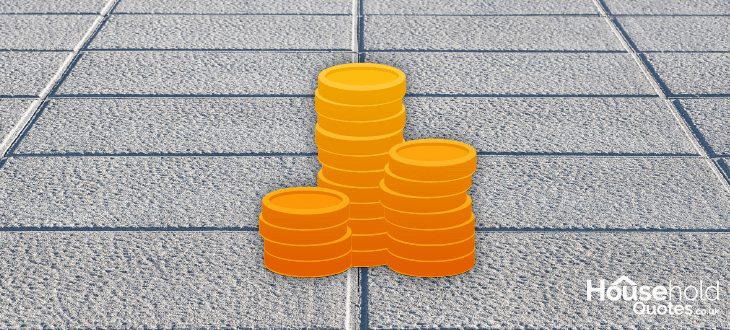
The average paving driveway cost can range from £20 to £150 per m2, depending on the type of driveway slab chosen. For instance, Indian sandstone slabs are less expensive because they are readily available and inexpensive to manufacture, reducing overall expenses. Porcelain is more expensive as it is a man-made product with a more complex manufacturing process.
Various factors influence the cost of driveway slabs, including the size and shape of your driveway, your location, and its current condition. Driveway specialists typically charge a daily rate of £150 to £200 per person. The longer it takes to complete the driveway, the higher the labour costs will be.
Costs will vary based on your location. For example, if you hire a local driveway specialist, you will pay less for transportation. Conversely, driveway companies may charge a premium in cities like London due to the higher cost of living compared to rural areas. Additionally, transporting materials and equipment to highly populated areas is more challenging, contributing to the overall cost of your driveway.
How to lay driveway slabs
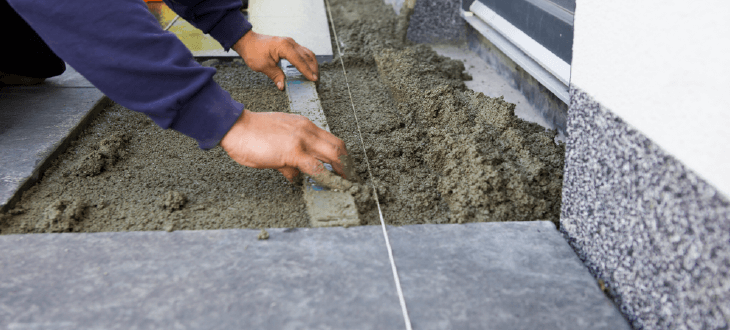
Laying driveway slabs requires careful planning and precise execution to ensure a durable and visually appealing surface.
Begin by measuring the area and selecting suitable slabs for your design. Once you have the measurements of your driveway, you can choose the size of the driveway slab. There are a few types to choose from, such as:
- 60 x 60cm: These are square and can create a chessboard pattern on your driveway using different colours.
- 60 x 90cm: These tiles are larger, longer, and more oblong, creating a luxurious feel for your driveway.
- 45 x 90cm: These paving slabs are twice as long as wide. This shape lends itself to various patterns.
After clearing the site, the area should be excavated to 100mm to 150mm. Once the debris has been removed, a crushed stone and gravel sub-base should be added. This layer should be 100mm to 150mm thick.
A sub-base helps to distribute weight evenly and prevents sinking under the weight of vehicles.
After adding the sub-base, you can add a weed barrier to protect your driveway from weed growth. While this step is optional, it is recommended.
Following this step, edging made from concrete, metal, timber, or plastic can be laid. Edging serves as a decorative feature and keeps the driveway in shape.
Driveway slabs are laid on a bed of cement around 20mm to 40mm thick to help the slabs stay in place. A rubber mallet can help fit the driveway slabs into place.
Driveway slabs can be laid with joints or without, depending on personal preference. If gaps exist between each slab, kiln-dry sand should be brushed between the joints after the slabs are laid.
Best slabs for driveway
Durability and aesthetics must be considered when choosing the best slabs for your driveway. Driveway slabs should be at least 50mm thick, as thinner slabs may crack under the weight of vehicles and lead to expensive repairs. It's best to opt for thicker slabs to avoid future expenses.
The most popular types of driveway slabs are made from natural stone, such as sandstone, limestone, and granite. These slabs offer exceptional durability and a timeless, elegant appearance, although they can be more expensive and require professional installation.
Porcelain slabs are also an excellent choice for driveways. They are known for resisting stains, scratches, and weathering, making them ideal for high-traffic areas.
Ultimately, the best slabs for your driveway will balance practicality, budget, and the desired aesthetic to create a functional and attractive entryway to your home. Below, we further detail the best slabs for driveways available in the UK.
Porcelain driveway slabs
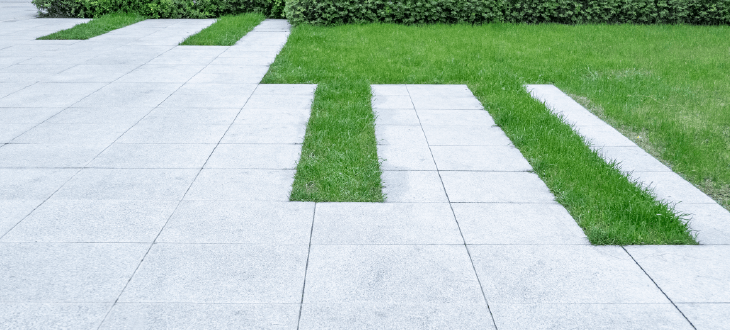
Porcelain driveway slabs are becoming increasingly popular for modern driveways due to their exceptional durability, aesthetic versatility, and low maintenance requirements.
These slabs are made with ground sand, feldspar, and excellent clay and fired at extremely high temperatures to create a dense, hard-wearing surface resistant to stains, scratches, and weathering. This makes them one of the best slabs for driveways.
Porcelain slabs are available in various colours, textures, and finishes, including convincing natural stone, wood, and concrete imitations. This allows homeowners to achieve a high-end look without the associated costs and upkeep.
Porcelain has a low water absorption rate of 0.01%, according to Marshalls, making it resistant to stains and spillages such as petrol and diesel and low-maintenance material. Furthermore, its low absorption rate makes it less prone to weathering and freeze-thaw cycles.
With their combination of aesthetic appeal, strength, and ease of maintenance, porcelain slabs are a smart, contemporary choice for anyone looking to enhance the functionality and appearance of their driveway.
Sandstone slabs driveway
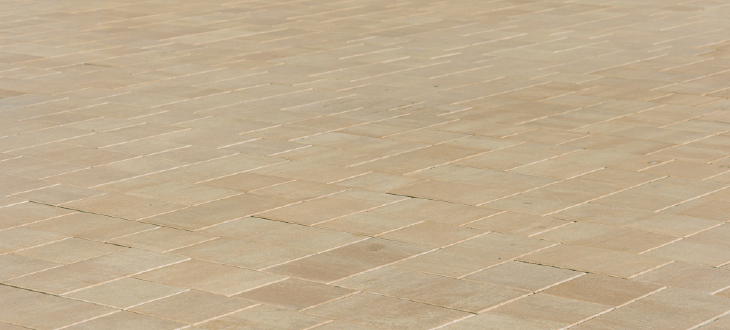
A sandstone slab driveway offers a perfect blend of natural beauty and durability, making it an attractive choice for homeowners seeking a rustic yet sophisticated look.
Sandstone adds timeless elegance to any driveway with its unique grain patterns and warm, earthy tones ranging from soft beige to vibrant reds and browns.
Known for its strength and resilience, sandstone can withstand significant vehicular traffic and weather conditions, making it a practical option for driveways. Its textured surface provides excellent grip, enhancing safety during wet or icy conditions.
Additionally, sandstone is relatively easy to maintain; it requires periodic cleaning and sealing to preserve its natural lustre and prevent staining from oil or dirt.
Sandstone slabs' natural aesthetics and durability make them a standout choice for creating a striking and functional driveway that enhances a home's curb appeal and value.
Limestone paving slabs for driveway
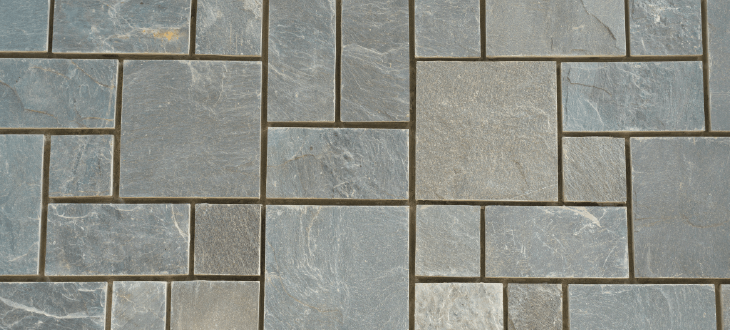
Limestone paving slabs are an excellent driveway option. They offer natural beauty, strength, and timeless elegance.
Limestone slabs have a smooth texture and come in cream, grey, and buff shades, blending well with different architectural styles. Due to their density and durability, they can handle heavy loads, making them perfect for driveways.
Limestone is naturally resistant to wear and tear. It has low porosity, which helps prevent water absorption and reduces the risk of damage from freeze-thaw cycles. It's also less susceptible to staining and easier to maintain. The naturally slip-resistant surface adds safety, especially during wet conditions.
While limestone can be more expensive and may require professional installation, it's a worthwhile investment due to its longevity and enduring appeal. A limestone driveway enhances curb appeal, adds elegance, and provides a durable surface that will retain its beauty and functionality for many years.
Granite driveway slabs
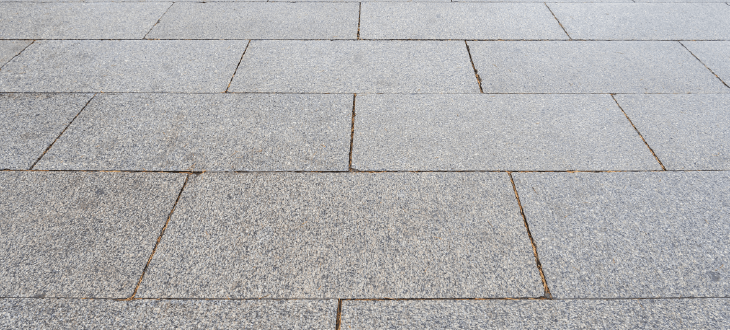
Granite driveway slabs are known for their exceptional strength, elegance, and lasting beauty, making them a premium choice for driveway surfaces.
Their extreme hardness and resistance to wear allow them to withstand heavy traffic and harsh conditions, ensuring a long-lasting and low-maintenance surface.
They come in various colours and patterns, including shades of grey, black, red, and speckled variations, which can complement any architectural style. The natural crystalline structure gives each slab a unique and luxurious appearance, enhancing the property's aesthetic value.
Granite's low porosity makes it resistant to water absorption and freeze-thaw damage, which is beneficial in fluctuating climates. Granite's inherent slip resistance contributes to the driveway's safety, reducing the risk of accidents during wet or icy conditions.
While granite slabs may require a higher initial investment and professional installation due to their weight and precision needed for a seamless fit, their durability and timeless elegance make them a worthwhile choice. A granite driveway enhances the curb appeal and ensures a robust, sophisticated surface that will stand the test of time.
Paving slabs driveway: colours and styles
Paving slab driveways offer various colours and styles, allowing you to customise your driveway to perfectly match your aesthetic preferences and enhance your property's curb appeal.
The colour palette for paving slabs is incredibly diverse, spanning from classic neutrals like grey, beige, and charcoal to more vibrant hues such as terracotta, sandstone, and even blues and greens.
These colour options can complement various architectural styles, whether modern, traditional, or rustic. Additionally, paving slabs come in many styles and textures, including smooth finishes for a sleek, contemporary look or more rugged, textured surfaces that replicate the appearance of natural stone, such as granite or limestone.
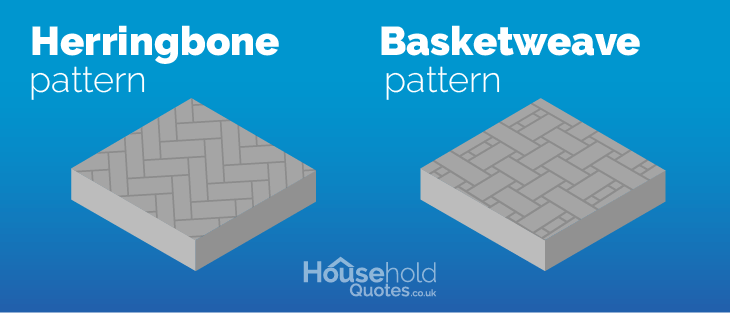
Popular styles include traditional patterns like herringbone and basket weave, which add a timeless, elegant touch, and more creative designs like crazy paving, which incorporates irregular slab shapes for a unique, organic feel.
Some slabs are designed to mimic the appearance of cobblestones or bricks, providing a historical or cottage-like charm. In contrast, others feature geometric shapes and clean lines for a minimalist, modern aesthetic.
With such a wide array of colours and styles available, paving slab driveways offer endless possibilities for creating a visually striking and personalised outdoor space that enhances the beauty and functionality of any home.
Pros and cons of a slabs driveway
Consider the pros and cons of using slabs when deciding on a driveway. Assess factors such as durability, maintenance, appearance, and cost to make an informed decision that aligns with your preferences and budget. Understanding potential challenges in advance allows for proactive planning to ensure the chosen option meets functional and aesthetic requirements.
- Durability: Driveway slabs are highly durable and can withstand heavy loads and frequent vehicle traffic without cracking or shifting. They are typically constructed from robust materials like concrete or natural stone, ensuring long-lasting performance.
- Low maintenance: Once correctly installed, slab driveways need minimal maintenance. They are easy to clean and require occasional resealing to maintain their appearance and protect against staining.
- Modern aesthetic: Driveway slabs create a modern, uniform surface with few joints for a seamless look.
- Versatility: Slabs come in various colours, textures, and sizes, allowing homeowners to customise their driveway to suit their aesthetic preferences and complement the style of their home.
- Weather resistance: Slab driveways are resistant to weather damage, including freeze-thaw cycles and UV exposure. Properly installed slabs can withstand temperature fluctuations and environmental factors without deteriorating.
- Initial cost: The initial cost of installing a slab driveway may be higher than that of other options, such as gravel, asphalt, or flat-poured concrete.
- Cracking: Slabs are typically durable, but they can develop cracks over time due to ground movement, settling, or harsh weather conditions. Proper installation techniques and high-quality materials can help reduce this risk. Still, it’s crucial to repair cracks promptly to prevent additional damage.
- Complex installation: Installing driveway slabs requires careful planning, preparation, and professional expertise. The base must be compacted appropriately, levelled, and reinforced to ensure stability and prevent shifting or sinking over time.
- Surface water drainage: Slab driveways are prone to surface water runoff, primarily if the slope is poorly graded. Proper drainage systems, such as channels, may be necessary to prevent water pooling and potential damage to the driveway.
If you've determined that driveway slabs are the best option for you after weighing the pros and cons, it's crucial to find a top-notch driveway installer who can meet your needs and budget.
Getting the best deal entails comparing quotes from different driveway specialists. Still, this process can be time-consuming and may not yield the ideal contractor.
Fortunately, Household Quotes has the solution. Complete our 30-second form, and we'll promptly provide you with four free, no-obligation quotes from local driveway specialists customised to your specific needs and budget. Don't delay—click below to discover more.
- Describe your needs
- Get free quotes
- Choose the best offer
It only takes 30 seconds

FAQ
The best material for a driveway is porcelain paving. It is durable, aesthetically pleasing, and stain-resistant due to its low water absorption. However, the choice of material for your driveway depends on your budget and personal preference.
The best driveway paving choice depends on several factors, including budget, aesthetic preferences, durability, maintenance requirements, and climate conditions. However, natural stone options like granite, limestone, and sandstone are among the most popular paving materials.
Indian sandstone paving is the most affordable option because the material is readily available and easy to process, reducing the overall cost.
Driveway slabs should be at least 50mm thick; anything thinner may crack and sink under vehicle weight.

Caoimhe is an experienced content writer and researcher who is passionate about providing accessible information to every reader. With a background in English literature and Sociology, she combines the two disciplines to create cohesive, well-thought-out, and well-informed pieces.
